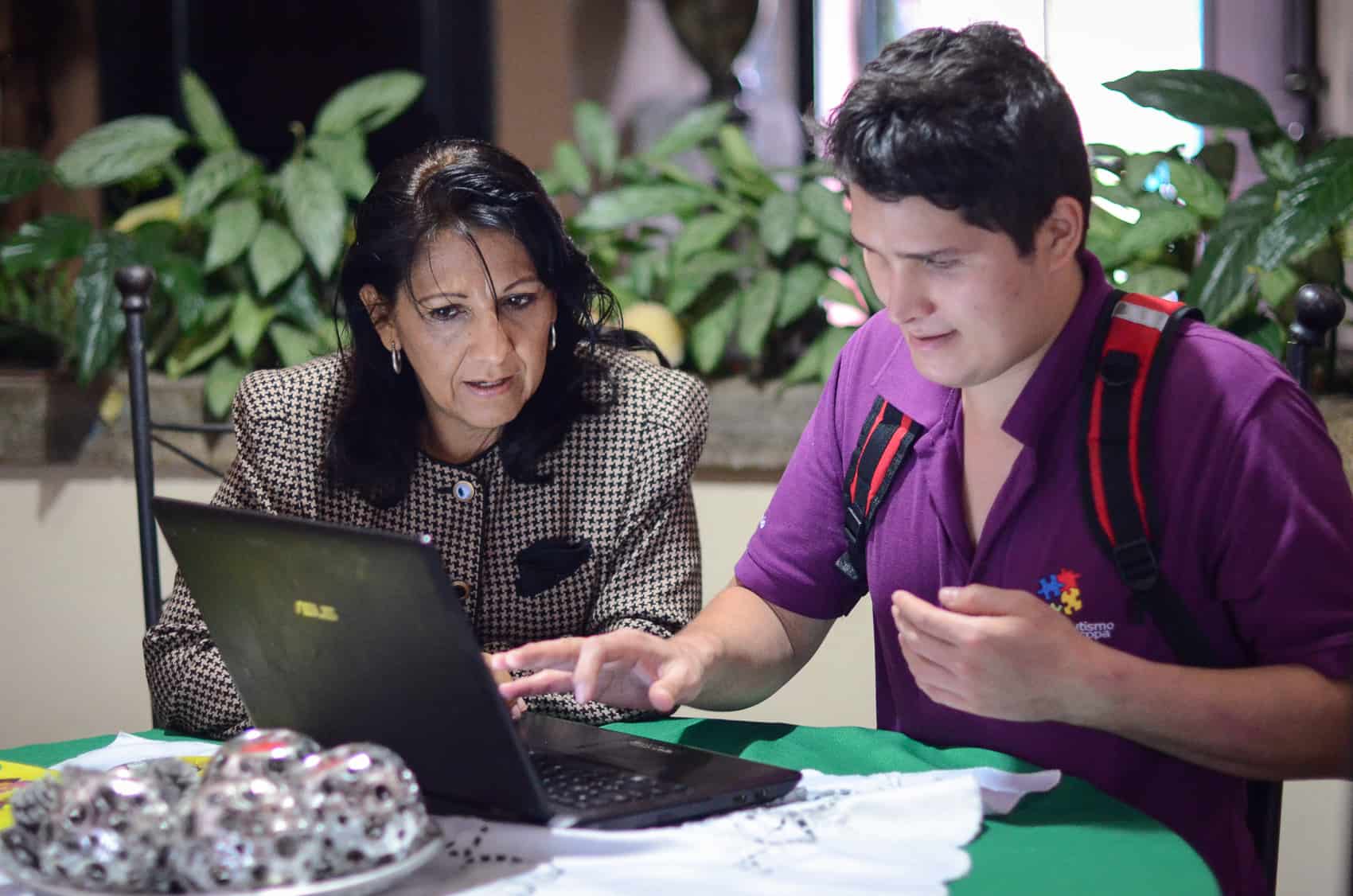Maribell Madrigal Cisneros sits down with her son, Marco Antonio, at a round dining table. She takes out a coloring book filled with basic words, and she slides it toward her son. She points to the first word, and he sounds it out.
“Vaca,” he says.
“¡Bueno!” exclaims Madrigal. She points to the next word.
“Casa,” says Marco Antonio, straining. “Cama… mapa…”
Such scenes unfold all over the world – a mother teaches her young son to read, patiently listening to his recitation, one word at a time, until he learns the patterns of pronunciation. But Marco Antonio is not a child; he is 29 years old, and when he was young, he was diagnosed with autism.
“I took him to a specialist,” recalls Madrigal, who visited many doctors to help explain Marco Antonio’s unusual behavior. “After five minutes of talking with him, the specialist told me that Marco Antonio had autism.” She draws a finger along her cheek. “I wept.”
But where others may have fallen to pieces, Madrigal began the slow process of learning about her son’s diagnosis. She has become heavily involved in the nation’s autism community. She is a coordinator at the nonprofit Autismo Costa Rica. She counsels parents regularly about their children with special needs, and she makes regular public appearances. She has even authored a book, “Nadie Dijo Que Sería Fácil” (“No One Said It Would be Easy”) about her experience raising Marco Antonio.
“Back then, there was nothing for autism,” she remembers of those dark early days. Today, autism awareness is growing at an unprecedented rate. Families are talking openly about their struggles. While services are still weak in Costa Rica, Madrigal has become an avid advocate for the autism community.
On the surface, Madrigal seems a traditional Tica mother. She grew up in the eastern suburb of Curridabat, and she has essentially lived her entire life in the same neighborhood. Madrigal studied Business Administration at the University of Costa Rica, where she met her husband (also named Marco Antonio), now a successful architect. She has two other sons, both of whom are single and still live in their childhood home.
“I have three children,” says Madrigal. “They finished school. But they’re here [at home]. Costa Rican mothers are very loving, very protective. We like to be familiar.” (In Spanish, “familiar” means “recognizable” but also “of the family.”)
Madrigal is also effusive and sweet. She talks in uninterrupted monologues, speaking with perfect diction and using her full body to express herself. She dresses smartly and seems to love hosting visitors in her home. In many ways, Madrigal is the portrait of Costa Rican motherhood.
However, her extraordinary drive and energy have also expanded her impact far beyond her own family. Her broader goal – to become a spokeswoman for families with special needs – has become a dominant force in her life. (Below is an interview she recorded with University of Costa Rica’s Nexos TV, just one of her many engagements).
To put it mildly, caring for an adult with autism is a challenging task. During The Tico Times’ visit to Madrigal’s house, Marco Antonio wanders nervously from room to room, loudly clearing his throat, crushing an empty plastic bottle, and changing radio stations on the stereo.
Although he rarely makes eye contact, Marco Antonio is very affectionate; he is known to embrace and even kiss the people he encounters. The behaviors are all benign, but he requires frequent attention. Now and again Madrigal rises from the couch, raises a finger, and murmurs, “Con permiso.” She attends to her son, makes sure everything is all right, and resumes our interview as if nothing has happened.
“My family is very close,” says Madrigal. “We are always together. This is not reality. Eighty-five percent of families with a child with special needs end up divorced. A lot of the time, a lot of mothers and fathers don’t know what to do. They lack the training. They don’t have education. I have a car. I have resources.”
Madrigal makes the task look effortless – not only tending to her son, but sustaining a strong marriage and helping other families cope. She fluently weaves a private and public life in a way that mothers were often discouraged from doing in years past.
“It’s changed only a little,” Madrigal reflects, looking unconcerned. “Before, a wife never worked. But in many cases, they have jobs now.”
As Madrigal sits on her wraparound couch, her living room seems like a metaphor for her family life: The space is voluminous and well decorated, the ceilings are high and the furniture is carefully arranged. The sliding doors open into a patio full of plants, with plush outdoor sofas and an enviable barbeque. While the other rooms are small and nondescript, the common areas are clearly the most important. This is where the family congregates. Here, in the middle of the house, is where their life truly takes place.
“[Marco Antonio] has taught me to be perseverant,” writes Madrigal in her book. “In my youth, I wanted everything as soon as possible and as easily as I could get it. With the birth of my son, everything changed. Things that would happen unnoticed in a normal child were for me true miracles, and years of hard daily work passed so that Marco could do them. I’ve learned not to let myself give up, to persevere each day, and I try to apply this to every event in my life.”






